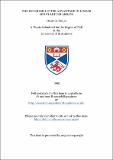The exterior-letter advantage in linear multi-letter arrays
Abstract
When linear arrays of unrelated letters (e.g., 'sfdthnc') are presented tachistoscopically centred across a fixation point, letters presented at exterior positions (e.g., 's----c') aregenerally reported more accurately than letters presented in interior positions. This "exterior-letter advantage" suggests that processing is more efficient for exterior letters than for interior letters. Previous researchers have argued that the exterior-letter advantage can be fully accounted for by the influences of lateral interference and mask configuration. However, the processes responsible for the exterior-letter advantage are far from resolved, despite the robustness of the phenomenon and its occurrence in numerous investigations into visual information processing. The experiments reported in this study investigated the role of lateral interference and backward pattern masking in the exterior-letter advantage. To investigate the role of lateral interference, performance was compared across complete 7-letter arrays and arrays in which the presence and proximity of flanking letters was varied by (i) presenting only exterior letters and their immediately flanking interior letter, (ii) varying the number blank letter-spaces by which these letter-pairs were separated, (iii) varying the nature of the characters presented in these displays, and (iv) presenting each exterior/interior letter-pair in isolation. The role of backward pattern masking was investigated (i) using different mask configurations which either matched or exceeded the left and right boundaries of complete letter arrays, and (ii) using masks which overlay only the positions of each exterior/interior letter-pair. The findings indicate that while lateral interference and mask configuration each played a part, neither an imbalance in the number of immediately flanking letters for interior and exterior letters nor mask configuration can entirely account for the exterior-letter advantage.
Type
Thesis, PhD Doctor of Philosophy
Collections
Items in the St Andrews Research Repository are protected by copyright, with all rights reserved, unless otherwise indicated.

